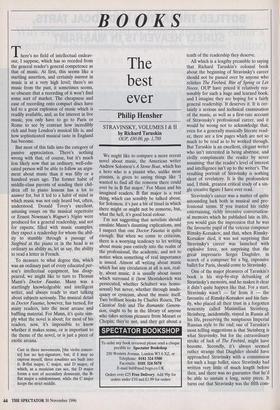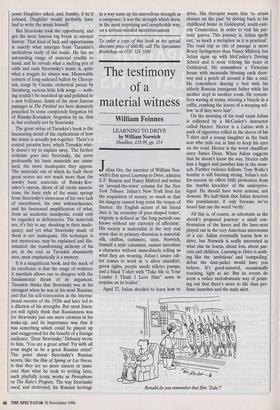BOOKS
The best ever
Philip Hensher
STRAVINSKY, VOLUMES I & II by Richard Taruskin OUP, £80.00, pp. 1,788 There's no field of intellectual endeav- our, I suppose, which has so receded from the general reader's general competence as that of music. At first, this seems like a startling assertion, and certainly interest in music is at a very high level; there's no music from the past, it sometimes seems, so obscure that a recording of it won't find some sort of market. The cheapness and ease of recording onto compact discs have led to a great explosion of music which is readily available, and, as for interest in live music, you only have to go to Paris or Rome to see by contrast how incredibly rich and busy London's musical life is, and how sophisticated musical taste in England has become.
But most of this falls into the category of passive appreciation. There's nothing wrong with that, of course, but it's much less likely now that an ordinary, well-edu- cated person will be able to follow an argu- ment about music than it was fifty or a hundred years ago. The former habit of middle-class parents of sending their chil- dren off to piano lessons has a lot to answer for, but it led to a habit of mind in which music was not only heard but, often, understood. Donald Tovey's excellent, amusing essays on the musical repertoire or Ernest Newman's Wagner's Nights were produced for a general readership, and not for experts; filled with music examples, they expect a readership for whom the abil- ity to stumble through a passage of Siegfried at the piano or in the head is as ordinary an ability as, let us say, the ability to read a letter in French.
To measure to what degree this, which was an ordinary part of every educated per- son's intellectual equipment, has disap- peared, we might like to turn to Thomas Mann's Doctor Faustus. Mann was a startlingly knowledgeable and intelligent writer, and always ready to start talking about subjects seriously. The musical detail in Doctor Faustus, however, has turned, for many readers, into the most arcane and baffling material. For Mann, it's quite sim- ply what the novel is about; for most of his readers, now, it's impossible to know whether it makes sense, or is important to the theme of the novel, or is just a piece of exotic arcana.
Cast in three movements, [the violin concer- to] has no key-signature, but, if I may so express myself, three tonalities are built into it. B-flat major, C major, and D major, of which, as a musician can see, the D major forms a sort of secondary dominant, the B- flat major a subdominant, while the C major keeps the strict middle. We might like to compare a more recent novel about music, the American writer Andrew Solomon's A Stone Boat, which has a hero who is a pianist who, unlike most pianists, is given to saying things like 'I wanted to find all the remorse there could ever be in B flat major.' For Mann and his imagined readers, B flat major is a real thing, which can sensibly be talked about; for Solomon, it's just a bit of tinsel in which there might or might not be remorse, but, what the hell, it's good local colour.
I'm not suggesting that novelists should emulate Mann's daunting explications, and I suspect that one Doctor Faustus is quite enough. But when we come to criticism, there is a worrying tendency to let writing about music pass entirely into the realm of the professional, the academic, and not to notice when something of real importance is issued. Almost all writing about music which has any circulation at all is not, real- ly, about music, it is usually about issues which surround it (how Shostakovich was persecuted, whether Schubert was homo- sexual) but never, whether through inade- quacy or cynicism, about the music itself. Two brilliant books by Charles Rosen, The Classical Style and The Romantic Genera- tion, ought to be in the library of anyone who takes serious pleasure from Mozart or Chopin; they're not, and they get about a tenth of the readership they deserve.
All which is a lengthy preamble to saying that Richard Taruskin's colossal book about the beginning of Stravinsky's career should not be passed over by anyone who relishes The Firebird, Rite of Spring or Les Noces. OUP have priced it relatively rea- sonably for such a huge and learned book, and I imagine they are hoping for a fairly general readership. It deserves it. It is cer- tainly a serious and technical examination of the music, as well as a first-rate account of Stravinsky's professional career, and it would be wrong not to acknowledge that, even for a generally musically literate read- er, there are a few pages which are not so much to be read as to be worked through. But Taruskin is an excellent, elegant writer who isn't interested in being abstruse, and civilly compliments the reader by never assuming: that the reader's level of interest and intelligence isn't up to the writer's. The resulting portrait of Stravinsky is nothing short of revelatory. It is the profoundest and, I think, greatest critical study of a sin- gle creative figure I have ever read.
Stravinsky's career was a matter of quite astounding luck both in musical and pro- fessional terms. If you trusted his richly entertaining, richly inventive conversation- al memoirs which he published late in life, you would gain the impression that he was the favourite pupil of the veteran composer Rimsky-Korsakov, and that, when Rimsky- Korsakov died, it was not surprising that Stravinsky's career was launched with explosive force, not surprising that the great impresario Sergei Diaghilev, in search of a composer for a big, expensive ballet for Paris, should come to Stravinsky.
One of the major pleasures of Taruskin's book is his step-by-step debunking of Stravinsky's memoirs, and he makes it clear it didn't quite happen like that. For a start, Stravinsky wasn't — far from it — the favourite of Rimsky-Korsakov and his fam- ily, who placed all their trust in a forgotten nonentity called Maximilian Steinberg. Steinberg, incidentally, stayed in Russia all his life, preserving the sumptuous Imperial Russian style to the end; one of Taruskin's most telling suggestions is that Steinberg is what Stravinsky, but for the extraordinary stroke of luck of The Firebird, might have become. Secondly, it's always seemed rather strange that Diaghilev should have approached Stravinsky with a commission for such a huge ballet, since Stravinsky had written very little of much length before then, and there was no guarantee that he'd be able to sustain a long, noisy piece. It turns out that Stravinsky was the fifth com- poser Diaghilev asked, and, franldy, if he'd refused, Diaghilev would probably have had to write the music himself.
But Stravinsky took the opportunity, and got the most famous big break in musical history. That kind of luck and opportunism is exactly what emerges from Taniskin's meticulous study of the music. He has an astounding range of material readily to hand, and he reveals what a melting pot of odds and ends Stravinsky's music is, quite what a magpie he always was. Memorable corners of long-unheard ballets by Cherep- min, songs by Gnesin, orchestral pieces by Steinberg, curious little folk songs — noth- ing couldn't be snatched up and polished to a new brilliance. Some of the most famous passages in The Firebird are here demurely preceded by some completely forgotten bit of Rimsky-Korsakov; forgotten by us, that is, but evidently not by Stravinsky.
The great virtue of Taruskin's book is the fascinating detail of the explications of how the music is actually put together. There's a central paradox here, which Tarusldn wise- ly doesn't try to explain away. The further criticism goes into Stravinsky, the more profoundly his basic materials are exam- ined, the more inadequate they appear. The materials out of which he built these great scores are not much more than the tawdry basic materials of Rimsky-Kor- sakov's operas, shorn of all exotic associa- tions; the basic style of the music springs from Stravinsky's awareness of his own lack of smoothness, his own awkwardnesses, and his fascinated amplification of what, from an academic standpoint, could only be regarded as deficiencies. The materials are, it's fair to say, shocking in their inade- quacy; and yet what Stravinsky made of them is not inadequate. His technique is not mysterious, may be explained and illu- minated; the transforming alchemy of his art, in the end, as Taruskin abundantly sees, most emphatically is a mystery.
It is a magnificent book, and the mark of its excellence is that the range of evidence it marshals allows one to disagree with the fundamental thrust of its argument. Taruslcin thinks that Stravinsky was at his strongest when he was at his most Russian, and that his self-reinvention as the interna- tional maestro of the 1920s and later led to a dilution of his strengths. But most listen- ers will rightly think that Russiatmess was for Stravinsky just one more element in his make-up, and its importance was that it was something which could be played up and exaggerated for the benefit of a foreign audience. 'Dear Stravinsky,' Debussy wrote to him, 'You are a great artist! Try with all your might to be a great Russian artist!' The point about Stravinsky's Russian scores, like the Rite of Spring or Les Noces, is that they are no more sincere or insin- cere than what he took to writing later, such playfully ironic works as Persophone or The Rake's Progress. The way Stravinsky used, and destroyed, his Russian heritage in a way sums up his marvellous strength as a composer; it was the strength which drew, in the most surprising and inexplicable way, on a serious-minded meretriciousness To order a copy of this book at the special discount price of £60.00, call The Specatator Bookshop on 0181 324 5500.



















































































 Previous page
Previous page